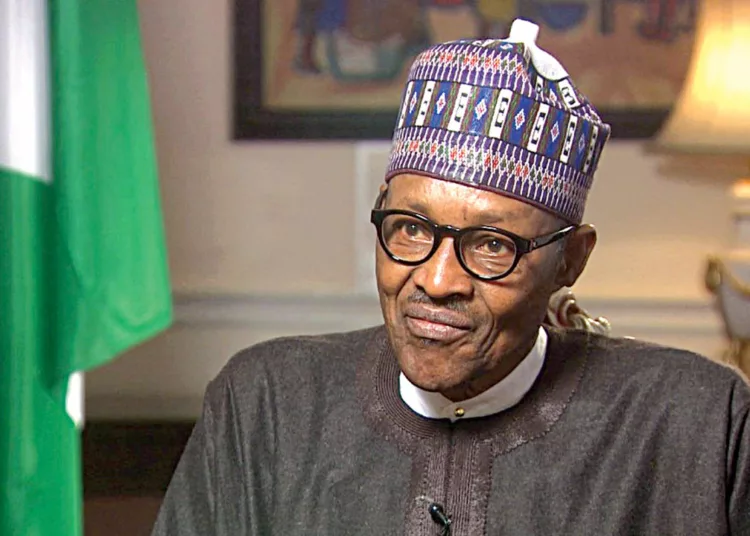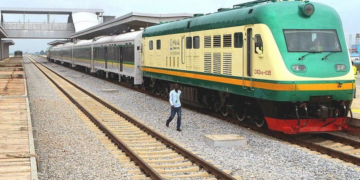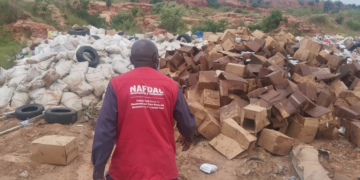Barely 24 hours after the federal government heaped the blame for the growing poverty on them, President Muhammadu Buhari has again accused state governors of thwarting development in the country by tinkering with local governments’ allocations.
According to the president, governors force council chairmen to sign that they have received 100 percent of funds allotted to local governments but pocket half of what the council chairmen signed for.
He decried the tendency of some key public functionaries to encourage corruption at the local government system, thereby inhibiting development at the grassroots.
The president spoke at a parley with members of the Senior Executive Course (SEC) No. 44 (2022) of the National Institute for Policy and Strategic Studies, Kuru.
Buhari narrated his personal experience on stemming the tide of corruption in the local government system after the presentation of the report of NIPSS SEC 44.
After listening to comments on the Course 44 presentation, themed, ‘‘Strengthening Local Governance in Nigeria: Challenges, Options and Opportunities”, by some members of the federal executive council, who aired their personal views on enhancing the autonomy of local governments, the president narrated his own experience on the treatment of local governments by some state governments.
‘‘I found it necessary to digress after reading my speech and this digression is as a result of my personal experience.
‘‘What they did, this is my personal experience, if the money from the Federation Account to the State is about N100 million, N50 million will be sent to the chairman but he will sign that he received N100 million. The governor will pocket the balance and share it with whoever he wants to share it with.
Buhari urged public office holders to be guided by their conscience and personal integrity wherever they find themselves.
He pledged that the recommendations contained in the presentation of SEC 44 will be painstakingly studied by the government with the view to implementing its recommendations.
Declaring that his administration has done so much in building trust between the government and the people, the president noted that the report would largely assist in the provision of good governance to the people at the grassroots levels and by extension win back their trust in government.
‘‘It is obvious that the government cannot afford to pay lip-service to the recommendations contained in this report.
‘‘I assure you that the Report will be treated with the seriousness and urgency it deserves. Government will study the report with the view to implementing the carefully detailed recommendations,’’ he said.
Commending the quality of the report, the commitment and dedication that went into it, President Buhari said the National Institute can always be trusted to deliver on very critical and sensitive assignments of national importance.
He expressed delight that the Institute has been exceptional in handling several assignments, and the current submission is a commendable improvement on the existing standards.
He added that he was convinced that they are all now well equipped for the strategic tasks, increased responsibilities, and positions of authority of trust.
‘‘I challenge you to go back to your various establishments, units, posts, beats, departments, directorates, Ministries, Parastatals, commissions, commands, agencies to revitalize, reinvigorate, reform and rejig your various platforms and spheres of influence, responsibility and leadership,’’ he said.
After listening to some demands by the leadership of NIPSS, President Buhari promised to look into some of the challenges facing the Institute, adding that no government establishment exists without challenges.
He assured them that his administration is poised to complete the review and passage of the NIPSS establishment act and condition of service before handover in May 2023.
To this effect, the president directed the Secretary to the Government of the Federation and Office of the Head of Service of the Federation to take all necessary steps to its actualization.
In his remarks, the D’director general of NIPSS, Prof Ayo Omotayo, said the course participants undertook study tours of 14 States of the Federation, six African countries and six countries outside Africa.
‘‘This enabled them to have both local and international perspectives on local governance, how to overcome challenges in achieving it, identify the available opportunities to strengthen it and develop workable options to be considered by the government in strengthening local governance,’’ he said. FG
Most Uncharitable To Blame Massive Poverty On Governors – Okowa, Wike
But definitely miffed by the federal government’s decision to blame the worsening poverty in the country on state governors, the governor’s of Delta and Rivers States, Ifeanyi Okowa and Nyesom Wike, have said it was most uncharitable fo the central government to say the states’ chief executives are responsible for the hardship being faced by the citizens
The Delta governor said yesterday that blaming states rather than identifying what steps should be taken to reduce poverty among the people “is, to say the least, most uncharitable.”
Speaking through Charles Aniagwu, the state commissioner for Information, Okowa cautioned the minister of State for Budget and National Planning, Clement Agba.
Speaking with LEADERSHIP Friday in an exclusive interview Aniagwu said, “At this point in time, it will not be healthy for anybody whether at the state or federal level, to be looking for who to blame for the challenges we have”.
He said at the federal level, the policies they brought in, pushed Nigerians more into poverty rather than taking them out of poverty.
He said, “What is most important is that we need a concerted effort to be able to deal with the very multi-dimensional level of poverty in our country.
“So, looking at states, saying that states did not embark on projects that should have done this, the reason why our people have become multi-nationally poor is because the economy has not been properly managed. The policy of this government, at the federal level, became much more ad-hoc rather than being something that is sustainable.
“What I would want the federal authorities to do is to take a major step to get all the states to come together because whether you like it or not, the people are taken out of poverty by these different levels of government.
“In Delta, you see what we have done in respect to human capital development, and the amount of strategic engagement that we have had as a result of creating jobs for our people and making them entrepreneurs.
“The federal government needs to also come out clean in terms of the policies that they have. When you wake and see the CBN moving away from monetary policies and dabbling into fiscal policies almost on a daily basis, is that the right way to get the economy to function?
“You hear the CBN saying they want to open up the corridor to Epe. Is it the business of CBN to begin to construct roads and to begin to do all those things? Those are fiscal issues that the central government needs to take into account so the CBN can concentrate on monetary policies. Our CBN has veered into that because of the failure of the central government to do a whole lot of things.
“We do hope that the central authority will take steps, as the father even if the component units are independent, to reduce poverty. As the father, this is the time to call your children, and tell them that our siblings are suffering, what do we do to solve the problem? You begin to look at the challenges of the states and how to fix it and get the country to function.
“This is not the time to put on a fine face, that you are not the one they are blaming. If you are the one they are blaming, are there no poor people in your state? So that is the reason why there must be cooperation between the tiers of government for the purpose of reducing this very multi-dimensional poverty that our people have sunk into in the last seven years specifically”.
Also, Rivers State governor, Wike, berated the minister for “exhibiting a lack of understanding on how governors plan development projects in their states.”
Wike said this yesterday while speaking at the inauguration of the 13.86km long Rumuodogo 1 and 2 Road in Oluua – Rumuodogo community in Emohua local government area of the state.
He stated that Agba was wrong when he said that governors are the cause of poverty because they focus on building flyovers, airports and other projects in the state capitals, while neglecting to invest in rural communities to directly uplift the living standard of the people.
Wike said, “He (Agba) said governors are the problem; they don’t do rural roads, and I ask him, where and where have you been? You just sit there (Abuja); you’ve not been anywhere to go and check whether rural roads are being done or not.”
Wike stated that the development plan of his administration is holistic with critical infrastructure delivered not only in the state capital, but across the 23 local government areas of the state.
The governor, therefore, advised the minister to take time out, leave Abuja and visit states, particularly, Rivers State.
He emphasised that there are quantum of projects in rural communities with the Rumuodogo road inclusive, which have improved the socioeconomic status of rural communities.
Wike said, “Come to Rivers State and see whether we are doing roads that will cause agricultural produce to be brought out to the cities or not before you open your mouth. We are not doing roads in the city alone. We are doing roads in all local government areas of the state.”
The governor also challenged some South-South state governors to stop hiding behind their attack dogs they have commissioned to insult him, adding that they should rather come to confront him personally.
He said, “Some people have been sending their people to insult me. I laugh. I heard some people call them Akwa Ibom professionals. They were insulting me. Tell the man who sent you to come out.
“You are just small kids. I am waiting for the big masquerade. Some people said they are Ijaw professionals. You that is sending them out, it is you I am looking for. I am not looking for these small fries.”
Wike wondered why those faceless governors are picking offence with him because he thanked President Muhammadu Buhari for releasing the 13% derivation arrears from 1999 to date.
The governor stated that even though he is never a fan of President Buhari, it does not stop him from expressing his gratitude to the president for releasing the fund that has helped to finance several projects in Rivers State.





